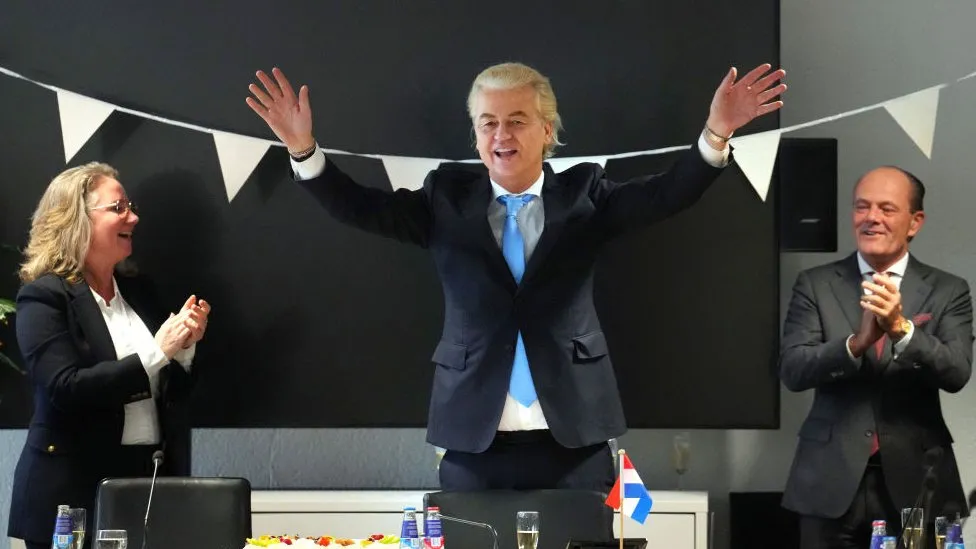Address
33-17, Q Sentral.
2A, Jalan Stesen Sentral 2, Kuala Lumpur Sentral,
50470 Federal Territory of Kuala Lumpur
Contact
+603-2701-3606
info@linkdood.com
Address
33-17, Q Sentral.
2A, Jalan Stesen Sentral 2, Kuala Lumpur Sentral,
50470 Federal Territory of Kuala Lumpur
Contact
+603-2701-3606
info@linkdood.com

Let’s dive into what Geert Wilders winning the Dutch elections means for the Netherlands. We’ll look at how it’s shaking up society, what new policies might come into play, and how it’s changing Dutch politics. This includes what it means for religious freedom, immigration, and the overall political scene.

Geert Wilders, known for his striking blonde hair and strong right-wing views, has won the Dutch elections. This is a big deal because Wilders is a controversial figure, especially for his tough stance against Islam. His win shows a major shift in Dutch politics and speaks to a group of people who feel like they’ve been ignored in the current social and political environment.
Wilders’ victory highlights how divided Dutch society is becoming. In diverse areas like Schilderswijk, there’s a real worry among Dutch Muslims about losing their religious freedom. Wilders wants to ban Islamic schools, the Quran, mosques, and even wearing hijabs in government buildings. This has made many people concerned about growing religious intolerance in politics.

With Wilders in power, there are big questions about religious freedom in the Netherlands. His plans could really change Dutch society, possibly limiting Muslims’ rights to practice their religion. The idea of banning headscarves in government buildings is especially worrying for Muslim communities.
Wilders’ win isn’t just about religion; it’s also about money. His populist talk has resonated in places like Duindorp, where people are struggling financially. Wilders wants to put Dutch citizens first when it comes to housing and welfare, which is appealing to those dealing with high living costs.
Wilders’ rise to power can be compared to other populist movements like Brexit in the UK and the political situation in the US. This is especially true when you look at his views on immigration and his wish for a ‘Nexit’ referendum. It’s part of a larger trend in Western democracies where leaders use public dissatisfaction to gain support.
A key part of Wilders’ platform is a tough stance on immigration. He wants to stop free movement within the EU and tighten asylum policies. If he goes through with these plans, it could really affect the Netherlands’ relationship with the EU and its position on global migration issues.

Q1: Who is Geert Wilders?
A1: Geert Wilders is a Dutch politician known for his right-wing views and distinctive blonde hair. He’s the leader of the Party for Freedom (PVV) and is famous for his strong stance against Islam.
Q2: What does Wilders’ victory mean for Dutch politics?
A2: Wilders’ victory marks a significant shift in Dutch politics. It shows that a part of the electorate, feeling overlooked, is supporting more right-wing, populist policies. This could lead to major changes in the country’s approach to issues like immigration and religious freedom.
Q2: How has Wilders’ win affected Dutch society?
A3: The win has highlighted the growing divide in Dutch society, especially in terms of religious tolerance. There’s increased concern among Muslim communities about potential restrictions on their religious practices and freedoms.
Q4: What are some of Wilders’ key policies?
A4: Wilders’ key policies include banning Islamic symbols and practices like mosques, the Quran, and hijabs in government buildings. He also focuses on prioritizing Dutch citizens for housing and welfare benefits and has a strict stance on immigration.
Q5: How does Wilders’ victory compare to other global political trends?
A5: Wilders’ rise mirrors other populist movements, like Brexit in the UK and certain political shifts in the US. These movements often capitalize on public dissatisfaction with the status quo, particularly around issues like immigration and national identity.
Q6: What could Wilders’ policies mean for the Netherlands’ relationship with the EU?
A6: Wilders advocates for a ‘Nexit’ referendum, similar to Brexit, and wants to restrict immigration and the free movement of labor within the EU. These policies, if implemented, could strain the Netherlands’ relationship with the EU and alter its role in global migration discussions.
Q7: Are Wilders’ policies likely to be implemented?
A7: It depends on various factors, including the composition of the Dutch parliament and the extent of support Wilders can garner from other political parties. Some of his more extreme proposals might face legal and constitutional challenges.
Q8: How are people in the Netherlands reacting to Wilders’ win?
A8: Reactions are mixed. Some support his views and feel he represents their concerns about immigration and national identity. Others are worried about the implications for religious freedom and social harmony. The division in public opinion is a reflection of the broader societal polarization.
Sources BBC